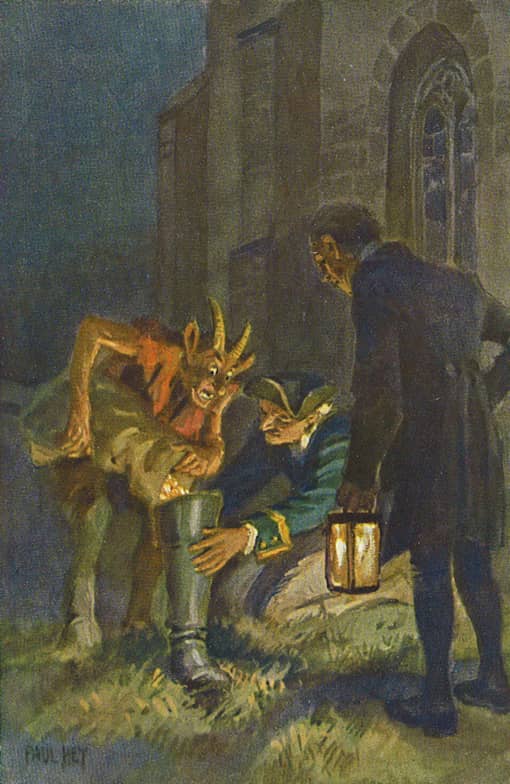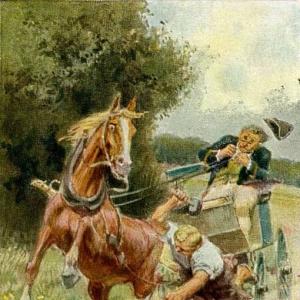Reading time: 11 min
A rich farmer was one day standing in his yard inspecting his fields and gardens. The corn was growing up vigorously and the fruit-trees were heavily laden with fruit. The grain of the year before still lay in such immense heaps on the floors that the rafters could hardly bear it. Then he went into the stable, where were well-fed oxen, fat cows, and horses bright as looking-glass. At length he went back into his sitting-room, and cast a glance at the iron chest in which his money lay.
Whilst he was thus standing surveying his riches, all at once there was a loud knock close by him. The knock was not at the door of his room, but at the door of his heart. It opened, and he heard a voice which said to him, „Hast thou done good to thy family with it? Hast thou considered the necessities of the poor? Hast thou shared thy bread with the hungry? Hast thou been contented with what thou hast, or didst thou always desire to have more?“ The heart was not slow in answering, „I have been hard and pitiless, and have never shown any kindness to my own family. If a beggar came, I turned away my eyes from him. I have not troubled myself about God, but have thought only of increasing my wealth. If everything which the sky covers had been mine own, I should still not have had enough.“
When he was aware of this answer he was greatly alarmed, his knees began to tremble, and he was forced to sit down.
Then there was another knock, but the knock was at the door of his room. It was his neighbour, a poor man who had a number of children whom he could no longer satisfy with food. „I know,“ thought the poor man, „that my neighbour is rich, but he is as hard as he is rich. I don’t believe he will help me, but my children are crying for bread, so I will venture it.“ He said to the rich man, „You do not readily give away anything that is yours, but I stand here like one who feels the water rising above his head. My children are starving, lend me four measures* of corn.“ The rich man looked at him long, and then the first sunbeam of mercy began to melt away a drop of the ice of greediness. „I will not lend thee four measures,“ he answered, „but I will make thee a present of eight, but thou must fulfil one condition.“ – „What am I to do?“ said the poor man. „When I am dead, thou shalt watch for three nights by my grave.“ The peasant was disturbed in his mind at this request, but in the need in which he was, he would have consented to anything. He accepted, therefore, and carried the corn home with him.
It seemed as if the rich man had foreseen what was about to happen, for when three days were gone by, he suddenly dropped down dead. No one knew exactly how it came to pass, but no one grieved for him. When he was buried, the poor man remembered his promise. He would willingly have been released from it, but he thought, „After all, he acted kindly by me. I have fed my hungry children with his corn, and even if that were not the case, where I have once given my promise I must keep it.“ At nightfall he went into the churchyard, and seated himself on the grave-mound. Everything was quiet, only the moon appeared above the grave, and frequently an owl flew past and uttered her melancholy cry.
When the sun rose, the poor man betook himself in safety to his home, and in the same manner the second night passed quietly by. On the evening of the third day he felt a strange uneasiness, it seemed to him that something was about to happen. When he went out he saw, by the churchyard-wall, a man whom he had never seen before. He was no longer young, had scars on his face, and his eyes looked sharply and eagerly around. He was entirely covered with an old cloak, and nothing was visible but his great riding-boots. „What are you looking for here?“ the peasant asked. „Are you not afraid of the lonely churchyard?“
„I am looking for nothing,“ he answered, „and I am afraid of nothing! I am like the youngster who went forth to learn how to shiver, and had his labour for his pains, but got the King’s daughter to wife and great wealth with her, only I have remained poor. I am nothing but a paid-off soldier, and I mean to pass the night here, because I have no other shelter.“ – „If you are without fear,“ said the peasant, „stay with me, and help me to watch that grave there.“
„To keep watch is a soldier’s business,“ he replied, „whatever we fall in with here, whether it be good or bad, we will share it between us.“ The peasant agreed to this, and they seated themselves on the grave together.
All was quiet until midnight, when suddenly a shrill whistling was heard in the air, and the two watchers perceived the Evil One standing bodily before them. „Be off, you ragamuffins!“ cried he to them, „the man who lies in that grave belongs to me. I want to take him, and if you don’t go away I will wring your necks!“ – „Sir with the red feather,“* said the soldier, „you are not my captain, I have no need to obey you, and I have not yet learned how to fear. Go away, we shall stay sitting here.“
The Devil thought to himself, „Money is the best thing with which to get hold of these two vagabonds.“ So he began to play a softer tune, and asked quite kindly, if they would not accept a bag of money, and go home with it? „That is worth listening to,“ answered the soldier, „but one bag of gold won’t serve us, if you will give as much as will go into one of my boots, we will quit the field for you and go away.“
„I have not so much as that about me,“ said the Devil, „but I will fetch it. In the neighbouring town lives a money-changer who is a good friend of mine, and will readily advance it to me.“ When the Devil had vanished the soldier took his left boot off, and said, „We will soon pull the charcoal-burner’s nose for him, just give me your knife, comrade.“ He cut the sole off the boot, and put it in the high grass near the grave on the edge of a hole that was half over-grown. „That will do,“ said he; „now the chimney-sweep may come.
They both sat down and waited, and it was not long before the Devil returned with a small bag of gold in his hand. „Just pour it in,“ said the soldier, raising up the boot a little, „but that won’t be enough.“
The Black One shook out all that was in the bag. The gold fell through, and the boot remained empty. „Stupid Devil,“ cried the soldier, „it won’t do! Didn’t I say so at once? Go back again, and bring more.“ The Devil shook his head, went, and in an hour’s time came with a much larger bag under his arm. „Now pour it in,“ cried the soldier, „but I doubt the boot won’t be full.“
 Image: Paul Hey (1867 – 1952)
Image: Paul Hey (1867 – 1952)The gold clinked as it fell, but the boot remained empty. The Devil looked in himself with his burning eyes, and convinced himself of the truth. „You have shamefully big calves to your legs!“ cried he, and made a wry face. „Did you think,“ replied the soldier, „that I had a cloven foot like you? Since when have you been so stingy? See that you get more gold together, or our bargain will come to nothing!“ The Wicked One went off again. This time he stayed away longer, and when at length he appeared he was panting under the weight of a sack which lay on his shoulders. He emptied it into the boot, which was just as far from being filled as before. He became furious, and was just going to tear the boot out of the soldier’s hands, but at that moment the first ray of the rising sun broke forth from the sky, and the Evil Spirit fled away with loud shrieks. The poor soul was saved.
The peasant wished to divide the gold, but the soldier said, „Give what falls to my lot to the poor, I will come with thee to thy cottage, and together we will live in rest and peace on what remains, as long as God is pleased to permit.“
 Learn languages. Double-tap on a word.Learn languages in context with Childstories.org and Deepl.com.
Learn languages. Double-tap on a word.Learn languages in context with Childstories.org and Deepl.com.Backgrounds
Interpretations
Adaptions
Summary
Linguistics
„The Grave Mound“ is a German fairy tale collected by the Brothers Grimm, Jacob and Wilhelm, in their famous anthology, „Grimm’s Fairy Tales“ (also known as „Children’s and Household Tales“ or „Kinder- und Hausmärchen“). The Brothers Grimm were German philologists, cultural researchers, and authors who collected and published folklore during the early 19th century. Their work played a significant role in the development of the fairy tale genre, and their stories have been adapted and retold in various forms across generations.
The Brothers Grimm collected their stories from various sources, including oral traditions and written works. These stories were not originally intended for children but were rather part of a broader cultural documentation effort. It was only after their publication that the tales gained popularity as children’s literature. The fairy tales often featured fantastical elements, moral lessons, and cautionary themes, reflecting the values and concerns of the time.
„The Grave Mound,“ like many other Grimm fairy tales, serves to impart moral lessons to its readers, highlighting the importance of compassion, generosity, and unity. The story also explores the themes of redemption and the dangers of materialism, as well as offering a cautionary tale against falling for the tricks of the Devil.
Though the story may not be as well-known as other Grimm tales like „Cinderella,“ „Hansel and Gretel,“ or „Little Red Riding Hood,“ it shares the collection’s overarching goal of teaching moral values and life lessons through entertaining narratives.
„The Grave Mound“ offers several interpretations and moral lessons:
The importance of generosity and compassion: The rich farmer’s wealth and success make him cold and uncharitable. His realization of this character flaw demonstrates the importance of being kind and generous to others, especially those in need. The farmer’s eventual act of generosity, though prompted by guilt, ultimately leads to the salvation of his soul.
The power of redemption: Despite the farmer’s past greediness, his soul is ultimately saved due to the kindness and loyalty of the poor man and the soldier. This suggests that it’s never too late for redemption, and one’s past actions can be outweighed by good deeds.
he danger of materialism: The rich farmer’s obsession with his wealth blinds him to the needs of others and distances him from his family. The story warns against the danger of materialism and encourages readers to value relationships and compassion over riches.
The strength of unity and teamwork: The poor man and the soldier join forces to outwit the Devil and save the rich man’s soul. Their cooperation and determination demonstrate the power of unity and the importance of standing together against evil forces.
The rewards of keeping promises: The poor man keeps his promise to watch over the farmer’s grave, even though it’s a difficult and frightening task. His loyalty and dedication result in the salvation of the farmer’s soul and a better life for his family. This highlights the value of keeping one’s promises and staying true to one’s word.
The cunning nature of the Devil: The Devil tries to manipulate the poor man and the soldier with gold, but they outsmart him. This serves as a cautionary tale against falling for the Devil’s tricks and deceit, as well as a reminder to remain vigilant against evil forces.
„The Grave Mound,“ also known as „The Giant’s Grave,“ is a popular fairy tale from the Brothers Grimm collection, and as such, it has inspired many adaptations in literature, film, and other media. Here are a few notable adaptations:
„The Giant’s Grave,“ a novel by Norman Jorgensen: This Australian novel for young readers retells the story of „The Grave Mound“ in a new setting, with a group of soldiers stranded on an island during World War II. The novel explores themes of courage, friendship, and the supernatural.
„The Grave Mound,“ a horror film by Benjamin Cooper: This 2012 horror film takes inspiration from the Grimm fairy tale and tells the story of a group of young people who visit a mysterious grave mound and are terrorized by the ghost of a giant. The film was praised for its eerie atmosphere and effective scares.
„The Giant’s Grave,“ a short story by Algernon Blackwood: This early 20th-century horror story takes elements from „The Grave Mound“ and combines them with Blackwood’s own style of psychological horror. The story features a group of travelers who come across a giant’s grave and are haunted by the ghosts of the past.
„The Giant’s Grave,“ a song by Loreena McKennitt: This haunting ballad appears on McKennitt’s 1997 album „The Book of Secrets“ and tells the story of a soldier who visits a giant’s grave and encounters supernatural forces. The song features McKennitt’s signature blend of Celtic and Middle Eastern influences.
„The Grave Mound,“ a video game level: This level appears in the popular video game „World of Warcraft“ and is based on the Grimm fairy tale. Players must navigate a treacherous grave mound and fight off the ghostly guardians that inhabit it.
Overall, „The Grave Mound“ has proven to be a rich source of inspiration for creative works across a variety of media, demonstrating the enduring appeal of the Grimm fairy tales.
„The Grave Mound“ is a Brothers Grimm fairy tale about a rich, greedy farmer and a poor man with many children. The farmer spends his days admiring his wealth, and when confronted by his conscience, he realizes that he has been hard and pitiless to his family and the poor. One day, the poor man asks the farmer for help, and the farmer agrees to give him double the requested amount of corn on the condition that the poor man watches over his grave for three nights after he dies.
Unexpectedly, the farmer dies three days later. The poor man keeps his promise and begins watching over the grave. On the third night, he meets a former soldier who offers to help him watch the grave. Soon after, the Devil appears, demanding that they leave the grave so he can take the dead man’s soul. The soldier refuses and bargains with the Devil, asking for a large sum of gold in exchange for their departure.
The Devil brings gold three times, attempting to fill the soldier’s boot, but the boot remains empty. With each failed attempt, the Devil becomes more frustrated. However, as the sun begins to rise, the Devil is forced to flee, and the dead man’s soul is saved. The soldier suggests giving his share of the gold to the poor and living peacefully with the poor man and his family.
The fairy tale „The Grave Mound“ by the Brothers Grimm offers a rich tapestry for linguistic analysis, revealing layers of narrative style, themes, and motifs characteristic of their storytelling. Here’s an exploration of its linguistic and thematic elements:
Narrative Style
Third-Person Omniscient Narration: The tale utilizes a third-person omniscient narrator, a common feature in fairy tales, allowing readers insight into the thoughts and emotions of characters. This perspective provides a moralistic overview of the rich farmer’s life and eventual redemption.
Direct Dialogue: Dialogue is an essential component, driving the narrative forward while revealing character motivations, as seen in the interactions between the farmer, the poor peasant, and the soldier with the Devil.
Moral and Didactic Elements
Moral Questions: The narrative presents moral questions directly to the character and, by extension, to the reader. The voice that questions the farmer acts as a moral compass, asking about his duty to his family and the poor, and his insatiable greed.
Redemption and Transformation: The rich man’s transformation from a greedy individual to one who performs an act of kindness is a central theme. This transformation is mirrored by the peasant’s fulfillment of his promise, highlighting the theme of honor and integrity.
Symbolism and Motifs
Wealth and Poverty: Wealth is depicted both as a source of trouble and a means to redemption. The abundance described in the farmer’s possessions contrasts sharply with the poverty of the peasant, setting the stage for the moral lessons to unfold.
The Grave as a Symbol: The grave, a representation of death, becomes a site of moral awakening and confrontation with the supernatural. It symbolizes the thin line between life, death, and moral judgment.
Character Archetypes
The Greedy Rich Man: This archetype is central to many fairy tales and serves as a cautionary representation of greed and selfishness.
The Needy but Honest Peasant: Another common archetype, the poor peasant symbolizes humility, perseverance, and integrity.
The Trickster Soldier: The soldier employs cunning to outwit the Devil, reflecting the archetype of the clever commoner who uses wit rather than force to succeed.
Language and Tone
Contrast in Tone: The tone shifts from the initial description of wealth and abundance to a more somber and reflective tone when addressing the moral failings of the farmer.
Use of Colloquialisms: The Devil’s language, such as „Be off, you ragamuffins!“ adds a colloquial and somewhat comedic relief to the tension, aligning with the playful yet instructional tone typical of fairy tales.
Interaction with the Supernatural
The Devil’s Presence: The embodiment of the Evil One in the tale highlights the recurring theme of good versus evil, with the Devil acting as the antagonist who ultimately fails due to his own greed and the cleverness of the protagonists.
In summary, „The Grave Mound“ is a rich text that employs linguistic features typical of the Brothers Grimm, such as moral questioning, symbolic use of wealth, and character archetypes to deliver a timeless message about greed, redemption, and the value of integrity. The story’s enduring appeal lies in its ability to weave these elements into a narrative that is both entertaining and morally instructive.
Information for scientific analysis
Fairy tale statistics | Value |
|---|---|
| Number | KHM 195 |
| Aarne-Thompson-Uther-Index | ATU Typ 815 |
| Translations | DE, EN, ES, FR, PT, IT, JA, NL, PL, RU, TR, VI, ZH |
| Readability Index by Björnsson | 28.9 |
| Flesch-Reading-Ease Index | 84 |
| Flesch–Kincaid Grade-Level | 5.9 |
| Gunning Fog Index | 8.8 |
| Coleman–Liau Index | 7.3 |
| SMOG Index | 8.4 |
| Automated Readability Index | 5.8 |
| Character Count | 7.725 |
| Letter Count | 5.876 |
| Sentence Count | 86 |
| Word Count | 1.496 |
| Average Words per Sentence | 17,40 |
| Words with more than 6 letters | 172 |
| Percentage of long words | 11.5% |
| Number of Syllables | 1.860 |
| Average Syllables per Word | 1,24 |
| Words with three Syllables | 69 |
| Percentage Words with three Syllables | 4.6% |

 Facebook
Facebook  Whatsapp
Whatsapp  Messenger
Messenger  Telegram
Telegram Reddit
Reddit














